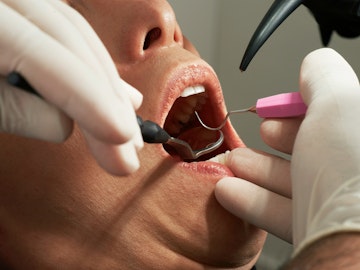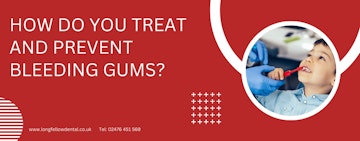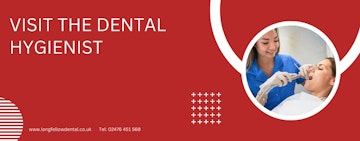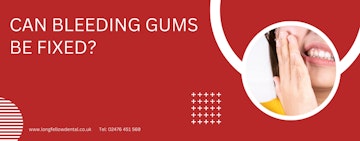
How To Treat And Prevent Bleeding Gums
Bleeding gums is not something that you should ignore. If you notice blood in your spit when you brush your teeth, it’s vital that you address this issue. Bleeding gums might not seem like a severe issue to start with, after all, it’s often only noticeable when you brush your teeth. However, this is a sign of a much more serious underlying condition that could cause widespread oral health problems if left untreated.
In this guide, we will explore some of the most common causes for bleeding gums, and how you can treat it. We’ll also look at some preventative steps you can take to avoid bleeding gums in the future.
What can cause bleeding gums?
Before delving into treatment and prevention methods, it's crucial to understand the common causes of bleeding gums:
Gingivitis: This is the earliest stage of gum disease and is characterised by inflammation of the gums. Gingivitis is often caused by poor oral hygiene, leading to the buildup of plaque and tartar along the gum line.
Periodontitis: If left untreated, gingivitis can progress to periodontitis, a more advanced form of gum disease. Periodontitis involves the destruction of the supporting structures of the teeth, including the gums, ligaments, and bone.
Brushing Too Hard: Aggressive brushing or using a toothbrush with hard bristles can irritate the gums and cause them to bleed.
Flossing Infrequently: Inadequate flossing can allow plaque and food particles to accumulate between the teeth, leading to gum inflammation and bleeding. Your teeth won’t be accustomed to the flossing, which can lead to bleeding when you do finally floss. This is why daily flossing is essential for gum health.
Poor Nutrition: A diet lacking in essential nutrients, particularly vitamin C, can weaken the gums and make them more susceptible to bleeding.

How do you treat and prevent bleeding gums?
The first step in treating your bleeding gums is to understand the cause. If you experience persistent or severe bleeding gums, it's essential to seek professional dental care promptly.
Your dentist can evaluate your oral health, identify any underlying issues, and recommend appropriate treatment options, which may include deep cleaning (scaling and root planing), antibiotics, or surgical intervention in advanced cases of gum disease.
Depending on the cause of your bleeding gums, your dentist might suggest the following preventative measures:
Maintain good oral hygiene
Brush your teeth at least twice a day using a fluoride toothpaste and a soft-bristled toothbrush. Be gentle when brushing, using circular motions to clean all tooth surfaces and along the gumline. Floss daily to remove plaque and debris from between the teeth.
There are many different types of dental floss available, including floss tape and interdental brushes. If you are unsure which tool is right for you, speak to your dentist or dental hygienists. They can help you to select the right flossing tools that will set you up for success.

Visit the dental hygienist
Schedule regular dental cleanings to remove plaque and tartar buildup and to monitor the health of your gums. Your dental hygienist can help you to detect early signs of gum disease and provide appropriate treatment. You might need repeat appointments to get your gum disease under control.
Use antiseptic mouthwash
Rinse with an antiseptic mouthwash containing chlorhexidine or essential oils to reduce bacteria and prevent gum inflammation. However, avoid alcohol-based mouthwashes, as they can exacerbate dry mouth and irritation.
Address underlying health conditions
Certain medical conditions, such as diabetes and cardiovascular disease, can increase the risk of gum disease. Manage these conditions effectively through medication, lifestyle modifications, and regular medical care. If you are pregnant, you will also be at increased risk of developing bleeding gums.

Quit smoking
Smoking is a significant risk factor for gum disease and can interfere with the healing process. If you smoke, consider quitting or seeking support to kick the habit. Quitting smoking will have widespread health benefits, not just oral health benefits.
Improve your diet
Eat a balanced diet rich in fruits, vegetables, whole grains, and lean proteins to support overall oral health. Limit sugary and starchy foods, as they can contribute to plaque formation and gum inflammation. Fizzy drinks can also lead to oral health problems, as they are very acidic, and these acids can attack your tooth enamel and lead to increased tooth sensitivity.
Get stress under control
Chronic stress can weaken the immune system and increase the risk of gum disease. Incorporate stress-reduction techniques such as meditation, yoga, or deep breathing exercises into your daily routine.

Can bleeding gums be fixed?
Yes, bleeding gums is a very treatable condition and only requires a few small changes to your daily routine to help get things under control. It’s vital that you don’t ignore this sign in the hope that it will get better on its own. Bleeding gums is a sign that something is amiss, so it’s important that you take this seriously.
If you’re unsure how to treat your bleeding gums at home, it’s a good idea to schedule an appointment with your dentist for personalised advice and support.
Is it OK to brush bleeding gums?
You should continue to brush your teeth, even if brushing is causing them to bleed. Consider replacing your toothbrush if you think it might be the cause of your bleeding. You might also need to add flossing to your daily routine if you aren’t already doing this. Poor oral hygiene is often the cause of bleeding gums, so don’t skip brushing your teeth, even if it feels like brushing is the cause of the problem.
Closing thoughts
In conclusion, bleeding gums should not be ignored, as they can indicate underlying oral health problems that require attention. By adopting good oral hygiene habits, making healthy lifestyle choices, and seeking professional dental care when needed, you can effectively treat and prevent bleeding gums, preserving your oral health and overall well-being.

Call us to make your appointment
Interest-free credit available
Worried about the cost of treatment? We offer financing plans to allow you to spread the cost.